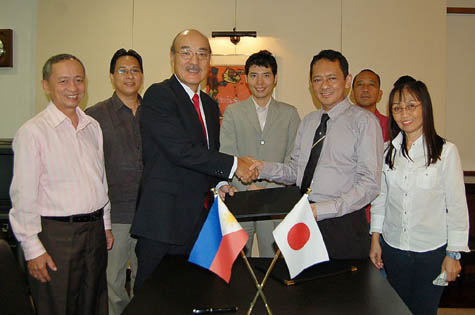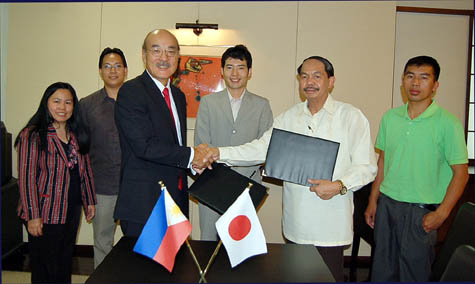

Ambassador Toshinao Urabe congratulates Atty. Mar de Asis, President of the University of Eastern Philippines, and Dr. Ben Ladilad, President of Benguet State University during the grant contract signing of “The Project for the Construction of the Regional Coconut Coir Technology and Productivity Center in Northern Samar” and “The Project for Construction of Food Processing Center in La Trinidad, Benguet” at the Embassy of Japan on 26 January 2012. Both ceremonies were witnessed by representatives from the University of Eastern Philippines, Benguet State University and the Embassy of Japan. |
Japanese Ambassador to the Philippines Toshinao Urabe signed two grant contracts for the construction of coco coir training center in Northern Samar and a food processing facility in La Trinidad, Benguet with Atty. Mar de Asis and Dr. Ben Ladilad, presidents of University of Eastern Philippines (UEP) and Benguet State University (BSU), respectively on 26 January 2012.
“The Project for the Construction of the Regional Coconut Coir Technology and Productivity Center in Northern Samar” and “The Project for Construction of Food Processing Center in La Trinidad, Benguet” are funded under the Grant Assistance for Grassroots Human Security Projects (GGP). More than 1,500 farmers in both provinces will benefit from the first - year operation of these projects.
Northern Samar is one of the poorest provinces in the country. Farmers in the area rely on coconut as their main income source. Their average monthly income is around PhP 2,400, which is below the poverty line of PhP 4,010 in the region. The challenge then is how to create value-added coconut products that can provide additional income to coconut farmers.
Through the grant assistance, amounting to US$109,503 (approximately 4.8 million pesos), a training center with dormitory will be constructed inside the campus of UEP in Catarman, Northern Samar. The center will teach coconut farmers how to turn coir fibers into processed products such as coco mattresses, carpets, ropes, and nets, using simple technologies developed by the u niversity. Some of these products have already been exported to China and Korea as well as being marketed locally. Around 3 50 coconut farmers and 50 trainees will be trained on coconut coir processing in its initial year of operation.
Acknowledged as the “salad bowl” of the Philippines, where majority of vegetables marketed in Luzon are sourced, La Trinidad is also famous for its strawberry production which earned it another title as the “strawberry capital” of the country. However, since land in Benguet became scarce due to the growing population, strawberry as well as vegetable production in the area has stopped expanding. With less space for agriculture, farmers are struggling to keep the amount of production. However, with the land limitation, it is hard for them to increase their income. The only way to address this growing concern is to enhance the value of these ingredient s through processing.
Through this grant assistance, amounting to US$ 107,806 (approximately 4.7 million pesos), BSU will construct a food processing center for strawberry and vegetable. Around 200 small-scale food processors per year will be trained on how to process food according to the standards of the Food and Drug Administration (FDA). By improving the quality of products and gaining the accreditation of FDA, food processors can sell their products at higher prices. In addition, around 900 farmers in La Trinidad and nearby municipalities will also benefit from the project through the sales of the ingredients.
The Government of Japan, as the top ODA donor for the Philippines, launched the GGP in the Philippines in 1989 for the purpose of reducing poverty and helping various communities engaged in grassroots activities. As of the end of 2011, 456 grassroots projects funded by GGP – ranging from roughly 1 to 4 million pesos – have been implemented by NGOs, local government units and other non-profit organizations. The total grant for these projects so far amounts to US$21,267,500. Japan believes that this project will not only strengthen friendship between the peoples of Japan and the Philippines but also the existing strategic partnership between Japan and the Philippines.
Japanese Version



